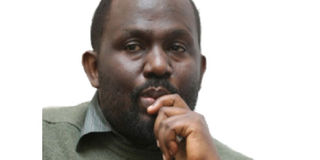120 years ago, what Apollo Kaggwa teaches us about Uganda today

For many years, President Yoweri Museveni has argued that for Uganda to become a rich and industrialised nation, it has to focus more of its education resources on the study of science and technology, and less on poetry, psychology, politics (the arts and social sciences, generally).
His government’s policy has, therefore, over the years shifted more and more state scholarships away from the arts and social sciences, to the pure sciences and technology.
The president is wrong, of course, but it is an argument that is not worth getting bogged down with today. Where a Museveni would have a point is in HOW the arts and social sciences are taught.
The irony is that a better study of the arts and social science, would argue be good for Museveni because some of what critics present as the more cynical and devious elements of his rule become more understandable.
Let us take the case of SirApollo Kaggwa, who has been described as a “major intellectual” of his time, an author, Buganda’s and “foremost ethnographer”. Kaggwa is more famous as regent Buganda Katikkiro (prime minister) for most of the period between 1890 and 1926.
Let’s take two episodes. Between 1885 and 1887, there was the so-called “religious war”, mainly in Buganda, with Protestants, Catholics, and Muslim factions vying for control.
Kaggwa, came to be seen as the leader what scholars have called the “Protestant faction.”
Beside being a man of letter, Kaggwa, we are told, was also a “good rifleman”, in many ways a Museveni of that time, and he fought in the religious war.
The Muslims had the early upper hand and scattered the Christians.
King Mwanga was deposed briefly, and Kaggwa and other Protestants fled into “exile”. Well, they didnot go too far. They fled to the neighbouring Ankole Kingdom, where King Ntare V Rugingiza gave them asylum.
The Protesants eventually prevailed. Mwanga got back his kingdom in 1890, and a triumphant Kaggwa became Katikkiro.
The thing about this event of nearly 130 years ago today, is that it should have been a useful reference point when Museveni took his bush war to Luwero in 1981.
The UPC used to argue that Museveni had been so rejected in the 1980 elections – he lost his shirt, coming third in Nyabushozi – so he could only opportunistically base his war in Buganda where anti-Obote sentiment ran very deep.
Some Buganda nativists and Museveni critics, on the other hand, hold that it was a cynical move to “destroy” Buganda through war, while preserving his own Ankole.
You can see that to argue this way, one has to ignore history. Even before we talk of the alliance that was to form between Bunyoro’s King Kabalega and Buganda’s Mwanga a few years later against British colonialism, the history of (later)-Ugandans seeking common cause and support for their local struggles from neighbours is older than modern day Uganda.
If anyone came to understand that, it was Apollo Kaggwa. Thus in his history of Buganda, he included pages on the neighbouring kingdoms of Bunyoro and Ankole.
Some of these things are politically inconvenient, especially if they offer a nuanced understanding of a president or government you despise, but yet we would deny ourselves usual tools for navigating the present and predicting how the next few years in Uganda’s politics might play out, if we bury them.
Taking this further, my grown up re-acquaintance with Apollo Kaggwa, led me to re-evaluate another commonly held view from our history.
Kaggwa was, by the standards of time, a visionary and moderniser. He was a big proponent of modern education.
From a citation from C.W. Hattersley’s “The Baganda at Home”, we learn that Kaggwa was “appalled by what he saw as a tendency of the sons of the nation’s leaders to grow up spoiled, in contrast to the spartan upbringing his generation received from the palace apprenticeship system.
He worked with British missionaries to establish boarding schools, notably King’s College Budo, explicitly to keep young noblemen from growing up spoiled.”
In our popular commentary and radical scholarship, Budo was established to entrench the privileges of Buganda—and Uganda’s—royalty and chiefly houses.
Though it was never created for peasant’s children, but to people like Kaggwa, you could say, Budo was supposed to “proletariatise the upper class”.
And the corollary, controversial, argument could be made that he thought boarding school made sense school only for the privileged children and was, essentially, bad for the poor.
Seeing the crisis that Uganda’s middle class is battling with its children today, it is truly remarkable that a man like Kaggwa was so strategically engaged with these issues 100 years ago.
Yet, if there was only government-funded education today under Museveni, very few would have the possibility to study anything new about him.
Onyango-Obbo is the publisher of Africa data visualiser Africapedia.com and explainer site Roguechiefs.com. Twitter@cobbo3




